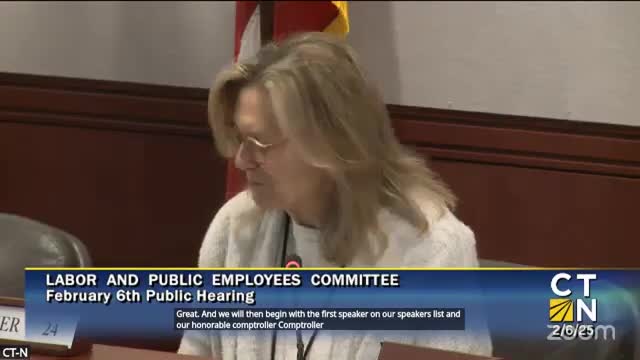Comptroller presses changes to Connecticut’s myCT savings program; PCAs, advocates press for enrollment access
Get AI-powered insights, summaries, and transcripts
Subscribe
Summary
At a Labor and Public Employees Committee public hearing, Comptroller Scanlon outlined a four-part bill (SB 1221) to update the state-run myCT savings retirement program; personal care attendants, unions and advocates urged the panel to expand access and fund enforcement and outreach.
Hartford — Comptroller Sean Scanlon told the Labor and Public Employees Committee that Senate Bill 1221 would make technical and operational changes to myCT savings, Connecticut’s state-sponsored retirement program, including allowing personal care attendants to enroll and aligning contribution rules with federal standards.
Scanlon, who said his office has run the program since rollout, told the committee the statute creating the program dates back to 2016 and that the proposed changes are intended to update the law and increase participation. “This program is personal to me,” he said, noting his small-business background and describing the effect retirement access has had for workers who previously had no accounts.
Why it matters: myCT savings is a state-run automatic IRA program meant to reach employees without employer-sponsored retirement plans. Advocates and the comptroller say expanding the program to cover roughly 12,000 personal care attendants (PCAs) and aligning it to federal contribution standards and the federal savers match would expand retirement access for low- and moderate-income workers.
Most important facts - Comptroller Scanlon said myCT savings has more than 6,900 participating employers, roughly 30,000 enrolled employees and about $36,000,000 in assets under management (figures given in testimony). He said the program is operating in 61 of Connecticut’s 169 municipalities. - SB 1221 would allow consumer employers of PCAs to enroll those workers in myCT savings, permit the program to open traditional IRAs to accept the federal savers match, align contribution levels with the federal Secure 2.0-era standards, and add a modest compliance regime for noncompliant employers. - The comptroller’s staff told the committee the program has three full-time staff, annual personnel costs of about $500,000 and an operational budget typically under $200,000 ($150,000 cited for the most recent year).
What supporters said Comptroller Scanlon and the program’s executive director, Jessica Muirhead, said the changes are modest operational updates intended to increase enrollment and to enable low-income workers to receive a federal savers match that begins in 2027. Scanlon said the office aims to pair outreach (town-by-town "business walks") with statutory updates and asked the panel to approve a compliance mechanism so the program can be enforced.
Union representatives, senior advocates and PCAs testified in support of the bill. AARP, the CT AFL-CIO and multiple PCAs described the program as a first step that will help workers who lack any retirement savings and said automatic payroll deductions dramatically increase the odds that people will save. PCAs described decades of caregiving work, low pay and no retirement options and asked legislators to allow PCAs to participate so they can accumulate accounts and — organizers said — reduce future strain on public safety-net programs.
Concerns and questions Several committee Republicans expressed reservations about a state-run retirement product that some said competes with private providers. Senator Sampson and others questioned whether the program’s scale justifies state involvement and asked for clearer projections (the comptroller provided an internal estimate that if fully implemented compliance could cover about 100,000 people in scope, an estimate Scanlon attributed to program staff).
Committee members also asked about fees, staffing and marketing budgets. Comptroller staff said program fees pay the operation (no ongoing taxpayer appropriation to run the trust); the office has used a line-of-credit arrangement and fee revenue to start operations. Muirhead said the program sends quarterly account statements to participants and that operational costs are largely consultant-driven investment oversight.
What the bill would change (as described in testimony) - PCA access: allow consumer employers who directly hire PCAs (many paid through Medicaid programs) to be treated as qualifying employers for myCT savings so residential caregivers can be enrolled; the state would facilitate payroll processing for those arrangements. - Federal alignment and contribution levels: permit the program to adopt federal contribution standards so the automatic default contribution can move from the law’s original 3% toward widely used default rates nearer 5%. - Savers match: permit opening traditional IRAs (in addition to Roth IRAs) so eligible participants can receive the federal savers match beginning in 2027. - Compliance: create a limited, graduated compliance regime for noncompliant employers (Scanlon reiterated his longstanding stance against suing small businesses but said the program needs a credible enforcement option to increase coverage).
Next steps and context This was a public hearing with testimony from the comptroller, program staff, unions and many personal care attendants. No committee vote was recorded at the hearing. Supporters urged the committee to advance the bill so program rules can be updated ahead of the federal savers-match rollout in 2027.
Ending Committee discussion continued after this testimony with detailed questions about contribution schedules, notice to participants, outreach funding and the tradeoffs between state-run and private retirement options.
